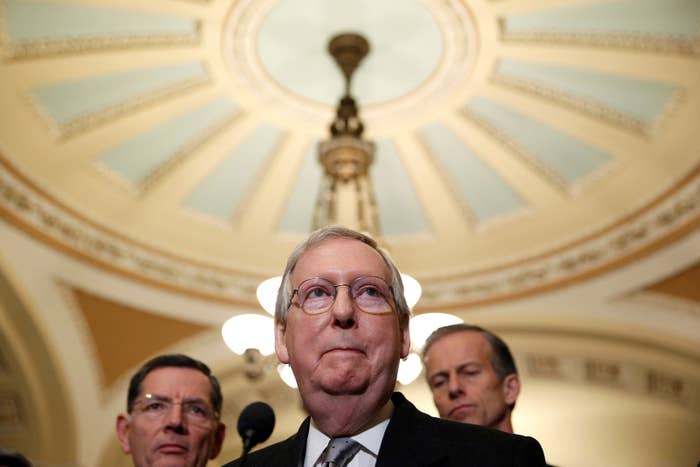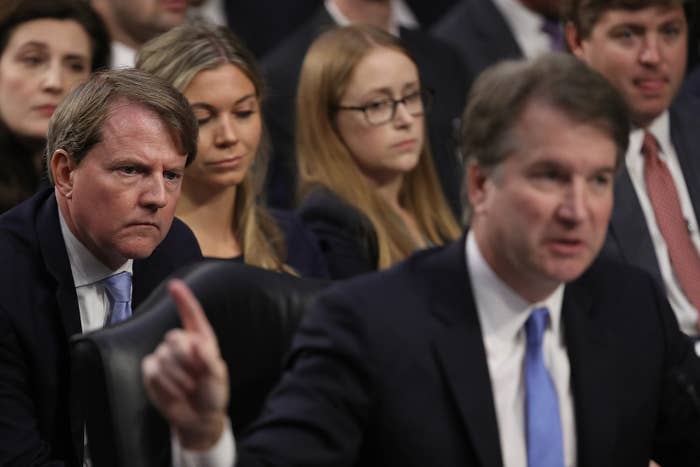
As the fight over Judge Brett Kavanaugh’s nomination to the US Supreme Court unfolded this summer, consuming most of the oxygen available for judge-related punditry and spurring millions of dollars in ad spending by outside groups, the Senate confirmed more than two dozen of President Donald Trump’s judicial picks to lifetime appointments with little fanfare.
Twenty-six federal appeals and district court judges secured seats on the federal bench in the two months since Trump announced Kavanaugh as his latest Supreme Court nominee. That’s more than the number of judges confirmed in the first half of the year, and more than the number of judges confirmed in all of 2017.
Getting a second justice confirmed to the Supreme Court is a legacy-defining priority for the Trump administration. That White House counsel Don McGahn and Senate Majority Leader Mitch McConnell managed to also pick up the pace on lower court judges while shepherding through Kavanaugh’s high-profile and contentious nomination underscores their shared drive to transform the entire federal judiciary while Republicans have the numbers in the Senate to do so.
The latest batch of newly confirmed judges includes five appeals court nominees. Only a small fraction of cases make it up to the Supreme Court, so the White House and Senate Republicans have placed a premium on getting seats filled on the circuit courts, where most cases end. Democrats over the summer agreed to expedite votes on 21 district court judges — a mix of nominees from red and blue states — to the dismay of liberals who want Democrats to use what limited tools they have left to hold up Trump’s picks. Two of the new district court judges received rare “not qualified” ratings from the American Bar Association.
The White House meanwhile has continued to push out more nominees. Since July, they've announced 10 nominees for the district and circuit courts.
Michael McGinley, a lawyer who left the White House counsel’s office in March but served as an outside adviser on the Kavanaugh nomination, told BuzzFeed News that the counsel’s office was split into teams, with some lawyers working almost exclusively on the Supreme Court nomination and others able to continue to focus on lower court judges. Planning for how they'd handle a second Supreme Court vacancy began soon after Justice Neil Gorsuch was confirmed last year, McGinley said.
“Don was just so focused on it and knew that it was one of, if not the most important thing he would do as White House counsel, and he didn’t want to run the risk of errors ... where you either weren’t ready for it and the selection process was a mess or you weren’t ready for it and you didn’t have a team ready to hit the ground running,” McGinley said.

McGahn is expected to leave the White House in the fall, per a tweet from Trump last month, but judges are expected to remain a priority, McGinley said. The “laser-like” focus on judges in the counsel's office flows from the top, he said — Trump has given McGahn “clear direction” on the kind of judges he wants, and that he wants things “done quickly and with high quality.”
The Senate confirmed 18 appellate and district court judges in 2017. That included a record-breaking 12 circuit court judges confirmed in the first year of a presidency. By the time Kavanaugh’s nomination was announced in early July, the Senate had confirmed another 23 judges in the first half of 2018.
It’s common for judicial nominations and confirmations to pick up steam in the second year of a presidency, but with 49 judges confirmed so far in 2018, Trump has already passed former president Barack Obama’s progress in his second year in office — the Senate confirmed 48 lower court judges in 2010, according to federal judiciary records. Trump still has time to meet, and possibly beat, the 72 lower court judges confirmed in George W. Bush’s second year.
The administration didn't make as much progress getting district court judges confirmed in its first year; the Senate confirmed six of Trump's nominees. The White House has accused some Democratic senators of refusing to engage in good-faith negotiations, and some Democrats made similar claims about McGahn. Without nominees that Democratic senators supported on the table, it was harder to put together a deal, McGinley said.
McGinley didn’t think the White House counsel’s office had specific numeric goals in mind when it came to confirming judges, but said they’ve pushed to make a dent in the 100-plus federal court vacancies, a list that only continues to grow as judges who are eligible to retire do so.
“We wanted to get as many done as possible as well as we could without compromising on quality,” he said.
There are 126 open appellate and district court seats, and another 26 vacancies have already been announced for this year and 2019. That represents about 17% of all active federal judgeships nationwide. If Trump filled those seats, plus the 49 judges he’s already gotten confirmed, his nominees would make up close to a quarter of active judges.
The 21 district court judges confirmed in August and September went through as part of a deal reached by McConnell and Senate Minority Leader Chuck Schumer. Before this summer, Democrats for the most part had refused to agree to end debate on Trump’s judicial nominees, forcing McConnell to spend a few days on each nomination, though Democrats didn’t have the votes to block them altogether.
This summer, however, Democrats agreed to go to final votes on the district judge packages and not force time-consuming procedural votes. Most of the 21 nominees were confirmed by voice vote, as opposed to more time-intensive, senator-by-senator roll call votes.
Three nominees confirmed this summer got through with largely party-line votes: 5th Circuit Judge Andrew Oldham, whom Democrats and liberal groups criticized for his record on women’s health and civil rights issues; 11th Circuit Judge Britt Grant, who clerked for Kavanaugh and is on Trump’s shortlist of potential Supreme Court nominees; and US District Judge Charles Goodwin of Oklahoma, who received a “not qualified” rating from the American Bar Association because of concerns about his work habits as a federal magistrate judge.
Agreeing to speed up votes on the district court nominees meant senators could get back on the campaign trail sooner, but it prompted a strong negative reaction from liberals, who accused Schumer and Democrats of giving up what little leverage they had left when it came to judges.
Schumer’s office has declined to comment on the backlash. A senior Democratic Senate aide told BuzzFeed News in an email that the nominees at issue were largely noncontroversial, and were going to get confirmed regardless of when exactly the vote took place.
Brian Fallon, executive director of liberal advocacy group Demand Justice, said the fact that these nominees weren’t considered controversial was beside the point — the agreement to expedite them meant Republicans could move on more quickly to controversial picks. Fallon said that as the midterms loom even closer, Democrats will again feel pressure to agree to move through judges in bulk in order to get back home. Politico reported Tuesday that McConnell planned to stay in session into October — time members usually spend at home campaigning in an election year — and noted that this could spur Democrats to reach another deal on nominees to get back on the campaign trail.
“My message is do not be a sucker again and make it easier for Trump and McConnell to confirm judges more quickly than they otherwise could,” Fallon said.

